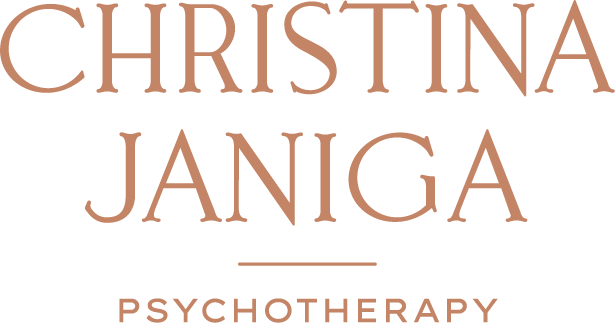Christina Janiga Psychotherapy - Blog
This blog is not a substitute for therapy, but provides evidence-based education for the purposes of self-help and information
Perimenopause, Anxiety, and PTSD: Understanding the Overlap
Many women are surprised when the emotional challenges of anxiety and post-traumatic stress disorder (PTSD) symptoms seem to intensify during perimenopause or menopause. If you’ve experienced trauma in your life—especially early in childhood—you may find that the hormonal changes of midlife bring old wounds back to the surface in unexpected ways.
The truth is, there’s a growing body of research that helps explain this connection. By understanding the biological and psychological overlap between perimenopause, anxiety, and PTSD, women can better prepare for these challenges and find effective paths toward relief and recovery.

Why PTSD Is More Prevalent In Woman During Perimenopause/Menopause
Studies show that PTSD is more than twice as common in women as it is in men, and women are also more likely to experience chronic symptoms that last a year or more. Historically, women were often excluded from PTSD research because hormonal cycles were seen as a “variable” that complicated results. Ironically, those very hormonal fluctuations are now understood as a key part of the story.
The Role of Estrogen in Anxiety and PTSD Symptoms
Estrogen influences mood, memory, and emotional regulation. Low estrogen levels—such as those experienced premenstrually, postpartum, or during perimenopause—have been linked to increased anxiety, depression, and intrusive thoughts.
In addition, the brain regions most involved in PTSD—the hypothalamus and amygdala—are rich in estrogen receptors. These areas also connect with the hypothalamic-pituitary-adrenal (HPA) axis, which governs our stress response and is linked to common menopausal symptoms like hot flashes, night sweats, heart palpitations, and disrupted sleep.
Early Childhood Trauma, The Oxytocin System, and Stress Regulation
For women with adverse childhood experiences (ACEs)—such as abuse, neglect, or exposure to violence—early trauma can disrupt the oxytocin system. Oxytocin works alongside cortisol to regulate stress responses. When oxytocin levels are lower, cortisol regulation suffers, leaving the body stuck in a heightened state of fear and hypervigilance.
This dysregulation can persist into adulthood, increasing vulnerability to PTSD symptoms during times of hormonal change such as perimenopause and menopause. It may also contribute to other chronic health problems associated with trauma.
Hormonal Changes in Perimenopause as a Trigger for Anxiety and PTSD Symptoms
While the exact mechanism is still being studied, research suggests estrogen may help protect against PTSD symptoms. For example, sexual assault survivors who received emergency contraception containing estrogen reported fewer PTSD symptoms months later. Similarly, some women find that hormone replacement therapy (HRT) not only eases physical menopausal symptoms but also improves emotional stability.
In perimenopause, fluctuating estrogen levels can make the emotional impact of PTSD feel stronger—especially when sleep disturbances, night sweats, and fatigue are layered on top.
The Double Impact of Trauma and Perimenopause Symptoms
Sleep problems are common in PTSD, and menopause can intensify them. In one study, among women who had experienced intimate partner violence or sexual assault, 25% had PTSD symptoms, and sleep issues were the most common symptom reported during menopause—followed by hot flashes and night sweats.
This combination of physical discomfort and emotional distress can make daily functioning more challenging. But understanding the link can be empowering—it opens the door to targeted, effective support.
Paths Towards Healing Anxiety, PTSD, and Trauma During The Perimenopause Phase
If you’re noticing an increase in anxiety and PTSD symptoms during perimenopause, it doesn’t mean you’re “going backwards” in your healing. It means your body and brain are adjusting to a significant life transition, and your needs may be changing.
Our team at Christina Janiga Psychotherapy, offer therapies that address both the trauma history and the hormonal transition that occurs in the perimenopause and menopause phases, including:
- EMDR Therapy, DBR Therapy, and Brainspotting to reprocess traumatic memories and reduce emotional triggers that are contributing to your PTSD symptoms.
- Trauma-Informed CBT Counselling to manage symptoms of anxiety, depression, and intrusive thoughts.
- Women’s Concerns Counselling to navigate perimenopause and menopause with emotional support and practical coping strategies.
Moving Forward with Awareness and Support
Understanding the science behind trauma and symptoms of anxiety, PTSD, perimenopause, and menopause can help you better anticipate challenges, track patterns in your symptoms, and find interventions that work for you. Therapy (including CBT, EMDR therapy, and trauma-informed care), medical support, lifestyle changes, and self-compassion all play a role in building resilience through this phase of life.
You don’t have to face this transition alone. If you’re ready to take the next step in your healing, book a consultation today. Together, we can help you navigate this season with greater ease, strength, and clarity.
References
- Estrogen and extinction of fear memories: implications for post-traumatic stress disorder treatment. Glover, Ebony, Jovanovic, Tanja. Biol Psychiatry, August 2015: 78(3): 178–185: doi: 10.1016).
- Exploring the mutual regulation between oxytocin and cortisol as a marker of resilience. Li, Yang, Hassett, Afton. Arch Psychiatric Nursing, April 2019: 33(2): 164–173: doi: 10.1016).
- Adverse childhood experiences and risk for first-episode major depression during the menopause transition. Epperson, C. Neill, Sammel, Mary. Journal of Clinical Psychiatry, March 2017, 78(3):298–307.
- Associations of intimate partner violence, sexual assault, and posttraumatic stress disorder with menopause symptoms among midlife and older women. Gibson, Carolyn, Huang, Alison. JAMA Internal Medicine, 2019; 179(1):80-87.
Book a free 15 minuted consultation call.
If you are interested in seeking therapy to help you process your trauma to decrease both PTSD symptoms and perimenopause/menopause symptoms, we encourage you to reach out to us for a free 15-minute consultation. During the consultation, we will answer any questions you have about our practice and our psychotherapists, and help you determine if we are the right fit for you. We believe that feeling comfortable with your therapist is essential for a successful therapeutic relationship.
About The Author
Christina Janiga, BSc, MACP, RP is a registered psychotherapist providing in person and virtual psychotherapy and therapy intensives in Burlington, ON and across Ontario. She is a Certified EMDR therapist and a EMDR Consultant. She is trained in multiple modalities of trauma-focused healing to best support individuals who are looking to feel better faster.

